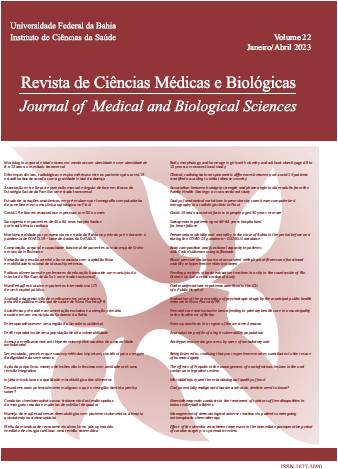Enteroparasitoses em uma região da Amazônia ocidental
DOI:
https://doi.org/10.9771/cmbio.v22i1.50124Palavras-chave:
Endoparasitos, Sazonalidade, VerminosesResumo
Introdução: as parasitoses intestinais são doenças que apresentam um problema de saúde mundial, causando grandes problemas nutricionais, onde sua ocorrência varia de acordo com o clima de cada região e condições socioeconômicas. Regiões que apresentam climas trópicos com umidade, altos índices de chuvas e temperaturas elevadas associadas com a falta de informações sobre as enteroparasitoses merecem atenção. Objetivo: o presente trabalho buscou avaliar os tipos de enteroparasitoses entre os anos de 2018 a 2020 em uma parcela da população de um município da Amazônia Ocidental, mais especificamente, (i) avaliar os tipos de enteroparasitoses que acometem a população entre os períodos de inundação e estiagem; (ii) avaliar a influência das enteroparasitoses em indivíduos de acordo com o gênero e a faixa etária ao longo de três anos. Metodologia: as coletas de dados foram realizadas entre os anos de 2018 a 2020, por meio de análises de planilhas concedidas pelo laboratório de análises clinicas LABSUL. Resultados: foram avaliados 4236 exames de fezes, sendo que apenas 1396 foram positivos para enteroparasitoses. Dos quais a maior parte foi causada por protozoários (58,69%) que acometeram principalmente Mulheres, jovens e crianças nos períodos de inundação. Conclusão: diante disso, os dados demonstraram que as enteroparasitoses acometem com frequência uma parcela da população local. Além de trazer informações que podem reforçar a necessidade da implementação do sistema de saneamento básico, juntamente com campanhas de conscientização populacional a respeito das vias de contaminação e da forma de propagação dessas infecções.
Downloads
Downloads
Publicado
Como Citar
Edição
Seção
Licença
Copyright (c) 2023 Revista de Ciências Médicas e Biológicas

Este trabalho está licenciado sob uma licença Creative Commons Attribution 4.0 International License.
A Revista de Ciências Médicas e Biológicas reserva-se todos os direitos autorais dos trabalhos publicados, inclusive de tradução, permitindo, entretanto, a sua posterior reprodução como transcrição, com a devida citação de fonte. O periódico tem acesso livre e gratuito.






